Sundays too my father got up early
and put his clothes on in the blueblack cold,
then with cracked hands that ached
from labor in the weekday weather made
banked fires blaze. No one ever thanked him.– Robert Hayden, ‘Those Winter Sundays’ (1966)
Lately, I’ve been obsessed with Jungian psychometrics.
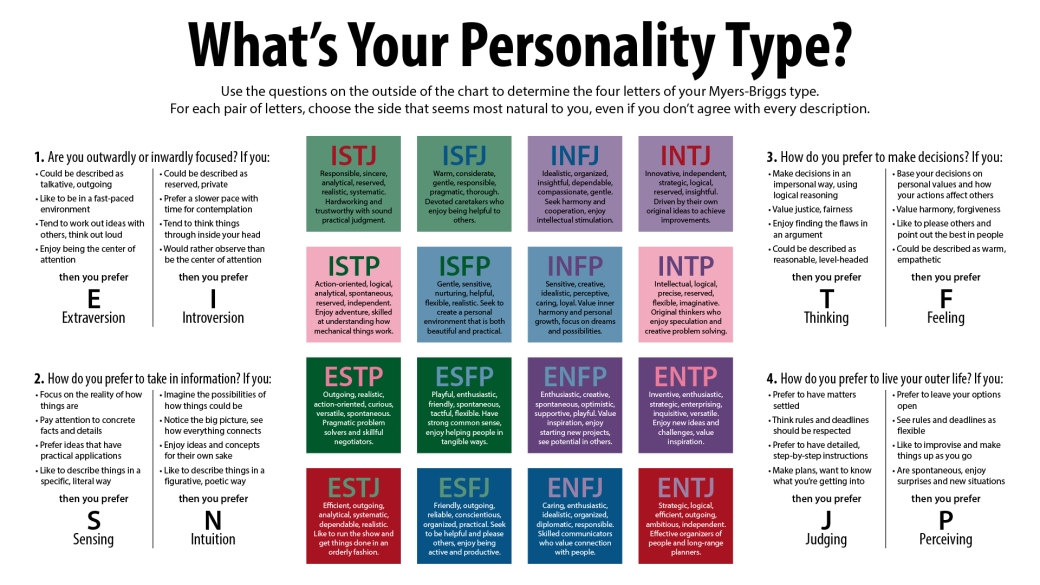
Basically, this means I’ve been bugging everyone around me with requests that they take the Myers-Briggs test, after which I’d compare their result against my prediction of their ‘type’. I’m sure it’s just another one of my passing fads, but apparently this fascination with clinically profiling psychoanalysing people is a very ‘INTJ’ thing to do (my Myers-Briggs type).
Yesterday, I sent my dad a link to the test, and was not surprised when he told me he got ‘ISTJ’, which is exactly what I had expected his type to be.
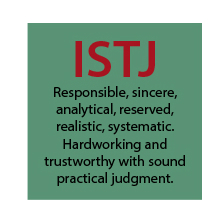
According to the NERIS Analytics site,
The ISTJ personality type is thought to be the most abundant, making up around 13% of the population. Their defining characteristics of integrity, practical logic and tireless dedication to duty make ISTJs a vital core to many families, as well as organizations that uphold traditions, rules and standards, such as law offices, regulatory bodies and military.
In short, ISTJ = all dads of the world. No, scratch that – all good dads of the world.
I think the above is a fair description of my father, but I wonder if one’s MBT changes over time, because I’ll wager anything that had he taken this test in his twenties, he wouldn’t have gotten ISTJ.
At all.
#manabouttown #intergenerational #dirt #hearditthroughthegrapevine
Given that there’s just a one letter difference between INTJ and ISTJ, you’d probably think that they are quite compatible types. Interestingly, though, out of all four categories, it is the ‘Intuition vs. Sensing’ (N vs. S) one that most determines compatibility. In fact, you could put an INTJ and an ENFP together and they’d get along just fine, but put an INTJ and an ESFP together, and they’ll probably be at each other’s throats before you can even say friends.
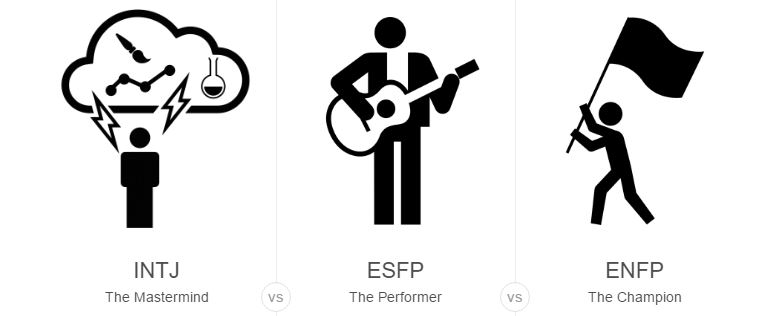
This is because the ‘N vs. S’ distinction is more innate and fundamental than the others, as it concerns the way through which a person understands the world and makes sense of human experience. In general, ‘N’ types tend to be big ideas-people looking forward to the future, while ‘S’ types tend to be pragmatic doers who focus on the present.
I suspect, then, that reliable parents would most likely fall under ‘S’, but if they give their kids enough support and freedom to explore and pursue intellectual interests, then there’s a good possibility they’ll end up raising ‘N’ type children instead.
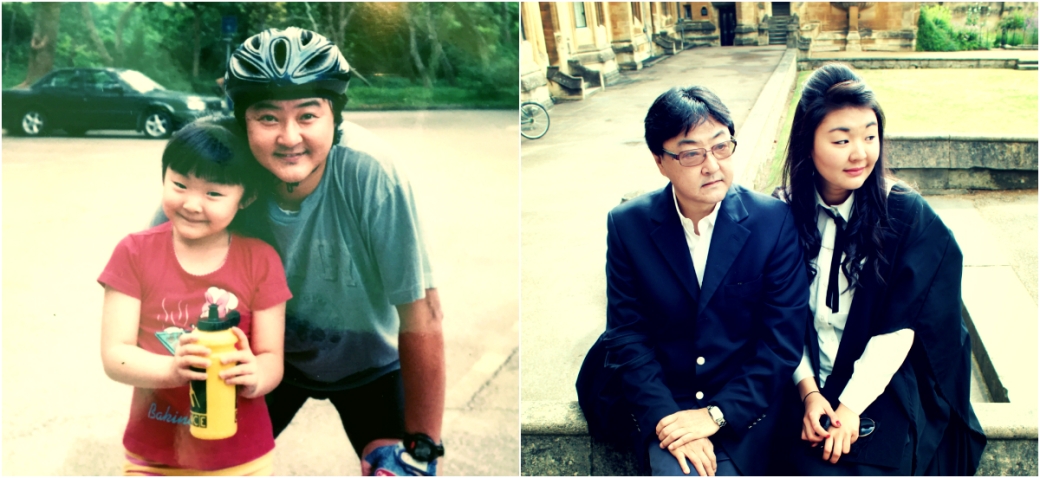
My old man and me – from 1998 to 2015
On this, there’s both good and bad.
The good thing is that they probably won’t have to worry too much about their children’s future, since the children themselves will have already beaten them to the punch by mapping out some kind of career path from the get-go (and a Plan B to boot).
The bad thing, though, is that ‘S’ parents and ‘N’ children usually don’t quite ‘get’ one another, especially when it comes to decision-making junctures on questions such as ‘what are you going to do with your life?’ and ‘where do you see yourself in ten years?’ More often than not, these discussions bottleneck at the point where the ‘S’ parent needs concrete reassurance in the present that the ‘N’ kid’s quixotic ‘plans’ will absolutely work and not leave them bankrupt and jobless and sad.
Want to ditch law school and write the next Booker Prize-winning biographical novel on Shakespeare? Dream on. At least being a lawyer guarantees a pay check – what if no one wanted to read your book about some Renaissance milksop?
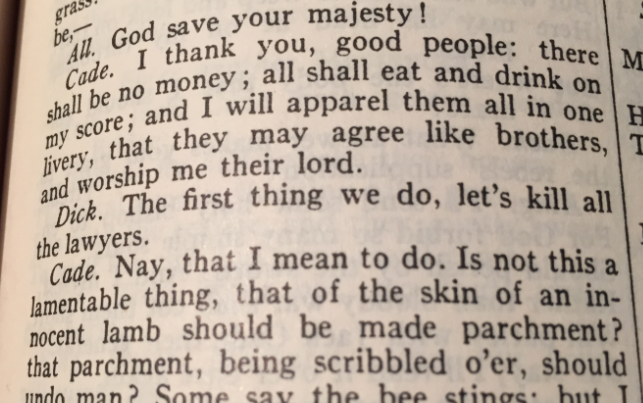
“The first thing we do, let’s kill all the lawyers.” (Shakespeare, Henry VI Part 2, Act IV Scene 2)
The NERIS description continues:
As ISTJ parents, […] their sense of responsibility and honour blends well with a tradition that has been in place since time immemorial: to raise one’s children to be respected, contributing members of home and society. As with most commitments, ISTJs do not take their roles as parents lightly, and will make it their work to ensure that this tradition is upheld to the highest standard.
This doesn’t always come easily for their children though, as ISTJs tend to be strict, with high standards and expectations. ISTJ personalities establish stable, clearly structured environments for their children, always with an eye on helping them to develop a sense of place in society, and to fulfill useful roles.
It’s unsurprising, then, that as much as my dad and I get along as people, we find it harder to agree with each other as family, especially when we broach ‘macro’ topics about values, worldviews and – what the hell – my life and what I’d like to do about it going forward.
This is probably why we rarely ever talk about ‘macro’ things in depth; the process is just too draining.
That he’s a man of few words also means I don’t usually get to hear his true thoughts until it’s crunch time, which is fine when our opinions align, but not so great when they don’t and neither one of us is willing to yield.
Memories of his outrage at finding out that I had applied to study English Literature over Law at university are still raw:
Life isn’t all about Tennyson and Chaucer, he said.
I’m only letting you do this because I love you, he said.

Intermission: Closing up, closing in
Sometimes, when it’s a nice Sunday morning and dad feels like taking the family Volkswagen out for a drive, I join him, only to feel a bit ungainly after the ride. This is to do with the long stretches of silence that often transpire between us in the car.
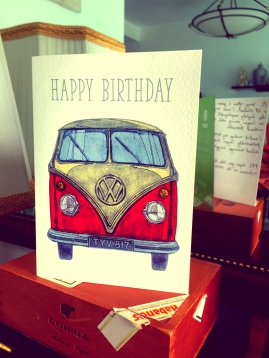
The birthday card I got him last year, note the Volkswagen reference
In Myers-Briggs terms, our reluctance to engage in chit-chat has much to do with our shared introversion (‘I’), but knowing this doesn’t quite take away the nagging sense that we could (should?) say so much more to each other, be it about the weather or his work.
Even when we do, our exchanges tend to be short and surface-skimming.
He also has this habit of tapping his fingers on the steering wheel that drives me cray cray up the wall: his drumming creates a pointless, kinaesthetic rhythm, and it always narks the shit out of me because the mechanistic sound accentuates our human silence, as his fingerprints on the wheel become a proof of our boredom, both with each other and with the situation at large.
It’s as if the second we set foot in the car a sense of inertia burgeons, and silence, being inertia’s auditory kin, takes on a second, material nature as I imagine it transmogrified into a Chinese wall, splitting apart the gearshift to atomise the car into two, separate halves: one of me in the shotgun, thinking about all the things he isn’t thinking about, and the other of him in the driver’s seat, still tapping, tapping, tap-pa-tee-tap-tap-tapping away while he cruises on, tapping still, wordless.
On this side – or perhaps on the other side too – of the inevitable noises, lay a dense, painful silence, the inquisitorial silence of the past observing us and the ironic silence of the future that awaits us.
(Jose Saramago, Skylight, p. 66)

A Portrait of the Father as an ISTJ man: finding my dad’s literary kin in Evan S. Connell’s Mr Bridge
Because this scene has played out one too many times, I decided to find out what really goes on in an ISTJ father’s mind. Hence my reading of Evan S. Connell’s Mr Bridge last week, an American realist classic that has been swept under the literary radar since its publication in 1969.
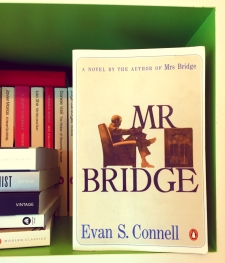 Connell’s style is understated and crystalline, which suits his portrayal of a 50s Midwestern family surprisingly well. There are 141 ‘episodes’ in total, all of which offer Sitcom-esque sketches of ‘All American’ domestic life. Unlike the other 20th century realist John Updike (my bae) who made it his artistic credo to “give the mundane its beautiful due”, Connell’s approach is more documentarian and down-to-earth, describing what is as is, but his descriptions are nonetheless pregnant with emotional energy and charged with masculine feeling.
Connell’s style is understated and crystalline, which suits his portrayal of a 50s Midwestern family surprisingly well. There are 141 ‘episodes’ in total, all of which offer Sitcom-esque sketches of ‘All American’ domestic life. Unlike the other 20th century realist John Updike (my bae) who made it his artistic credo to “give the mundane its beautiful due”, Connell’s approach is more documentarian and down-to-earth, describing what is as is, but his descriptions are nonetheless pregnant with emotional energy and charged with masculine feeling.
Anyway, I was given a glimpse of how an ISTJ father thinks in episode 42, titled ‘Home from the Office’, when the author begins to relay the Bridges’ banter at dinner, only to swiftly range in on Mr Bridge’s thoughts:
“Daddy, how was the day?” Ruth asked.
“I doubt if my days interest anybody at this table,” he laughed. […]
He sipped the drink, feeling too tired to eat, and wondered why he could not talk to the family about his work. At first when the children were small it was not possible, but now? What was there to say? They had asked, it was true. And whenever they asked, whether the questions were sincere or not, he had answered elliptically, turned the offer into an ironic joke. Why? He knew that he did want to confide in the family. Now they were asking. Why had he rejected the chance? He felt that he was close to understanding; then something intervened like a shade drawn down. After all, they could not possibly care about the testimony of a streetcar conductor involved in a traffic accident on the 18th of September of last year. […]
No, no, he thought, as he peered into his glass, there is almost nothing I can say to them. My life is cut in half. The halves remain side by side in perfect equilibrium like halves of a melon. I suppose the same is true of most men. Or are they somehow unlike me? Are they able to share themselves?
(p. 80-81, Penguin modern classics edition)
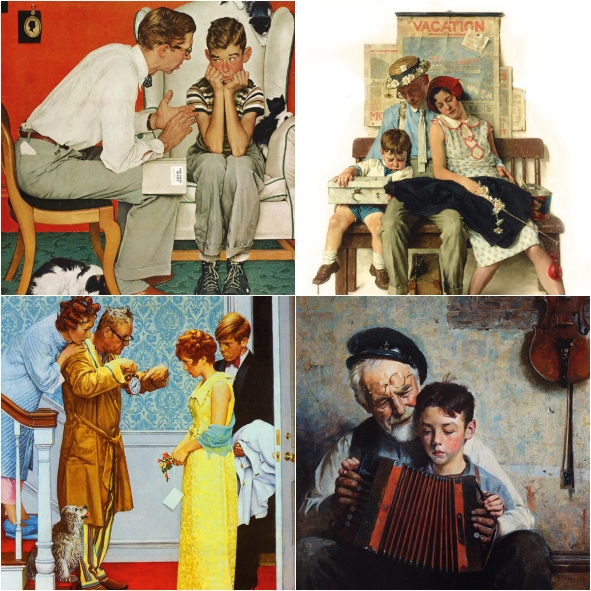
Norman Rockwell on fathers. Rockwell was a 20th century realist painter best known for portraying American culture and domestic scenes
Balance, detachment, reticence: Mr Bridge would be glad to know he’s got a pal in Papa Chan, both being introverts, lawyers and traditional ‘family men’.
I can only suppose my father has also considered the barrage of questions that Mr Bridge directs toward himself, but to be honest, I think he’s too practical-minded to be the self-agonising, philosophising type.
What’s funny to me, though, is that the only ‘question’ in this excerpt that he’s actually asked verbatim is not a real question, but a rhetorical one that shuts down, rather than opens up, conversation, because “what was there to say” after a tired day’s work?
Compared to my mom who’s an ESFJ (Extroverted-Sensing-Feeling-Judging), I actually find it easier to empathise with my dad’s aversion to saying more than is necessary, but being on the receiving end of reticence can still feel strange sometimes.
Tis a taste of my own medicine, as I’m sure my extroverted mother and friends would agree.
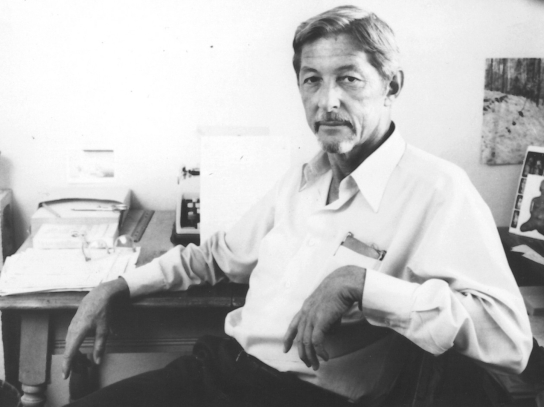
Evan S. Connell, circa 1984 (photo by Thomas Victor)
It’s not about the ‘E’ vs. ‘I’, but the ‘N’ vs. ‘S’: finding a ‘new dad’ in Philip Roth’s The Ghost Writer
Of course, reticence is only a symptom of our father-daughter communication (or lack thereof).
The root cause, I reckon, goes back to the ‘iNtuition vs. Sensing’ divide – the difference between his interest in grounded, practical matters and my interest in flightier, conceptual ideas.
He firmly believes that his no-frills pays-the-bills pragmatism is what has kept my ass covered for long enough to be able to indulge in literature and other pseudo-bohemian fancies, and I 100% agree.
Thanks dad. You’re the best. Xoxo.
So he’s happy that I’ve found a passion and that his genteel daughter has an arsenal of Shakespearean quotes up her sleeve (he thinks, I don’t), but honestly kid when are you going to come back down to Earth and realise that life is always about bringing home the bacon before chasing after ideals? It’s great that you’re writing on your blog and all, but none of it would mean a toss if you didn’t have your job right now, so keep filling up them coffers and don’t ever let itchy feet get the better of you.
At the risk of sounding ridiculously Freudian, I sometimes wonder if I gravitate towards books with irresponsible and dreamy fathers as protagonists (Updike’s Rabbit, Bellow’s Herzog, Roth’s Everyman etc.) because I’m subconsciously looking for a literary dad to counterpose my real one.
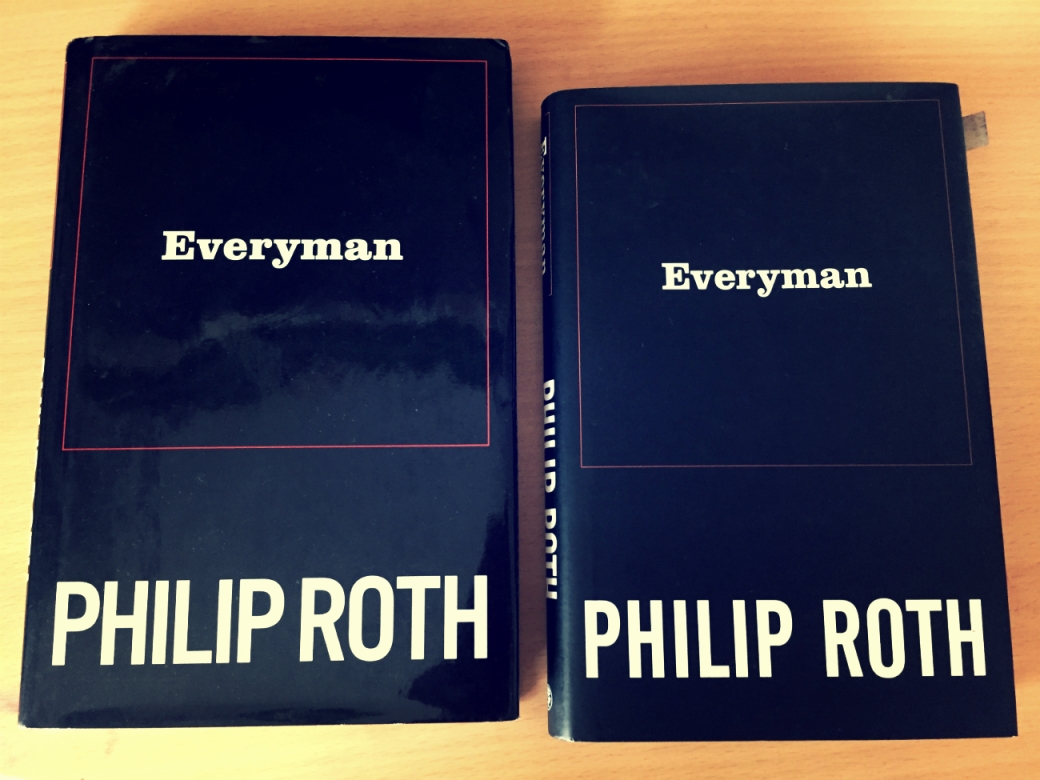
A ‘like father, like daughter’ coincidence: It turns out that dad and I each bought a copy of Roth’s ‘Everyman’ independently – him from ages ago; me last year while perusing the shelves at the St Giles Oxfam in Oxford. In true patriarchal spirit, his copy is – bizarrely – slightly bigger than mine.
Like Nathan Zuckerman in Philip Roth’s The Ghost Writer, I am constantly jonesing for a paternal anchor in fiction:
I had come, you see, to submit myself for candidacy as nothing less than E. I. Lonoff’s spiritual son, to petition for his moral sponsorship and to win, if I could, the magical protection of his advocacy and his love. Of course, I had a loving father of my own, whom I could ask the world of any day of the week, but my father was a foot doctor and not an artist, and lately we had been having serious trouble in the family because of a new story of mine. He was so bewildered by what I had written that he had gone running to his moral mentor, a certain Judge Leopold Wapter, to get the judge to get his son to see the light.
As a result, after two decades of a more or less unbroken amiable conversation, we had not been speaking for nearly five weeks now, and I was off and away seeking patriarchal validation elsewhere.
(p. 9, Vintage edition)
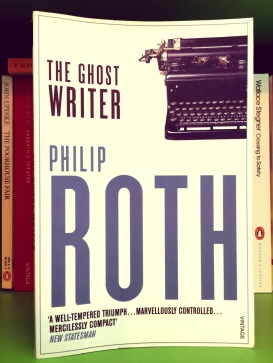 E. I. Lonoff is the famous author whom the protagonist Zuckerman admires, and at this moment, he’s filling us in on why he has travelled all the way from urban Manhattan to the author’s secluded abode – “a clapboard farmhouse… at the end of an unpaved road twelve hundred feet up in the [rural] Berkshires” (p. 3).
E. I. Lonoff is the famous author whom the protagonist Zuckerman admires, and at this moment, he’s filling us in on why he has travelled all the way from urban Manhattan to the author’s secluded abode – “a clapboard farmhouse… at the end of an unpaved road twelve hundred feet up in the [rural] Berkshires” (p. 3).
His own father, being a practical man with little patience for artistic frivolity, doesn’t seem to have gotten the memo that his son is a writer, and as such will (naturally) draw on the family’s dirty laundry as inspiration for his short stories. In return, Zuckerman seeks a kindred spirit in the father figure of Lonoff, a decision he makes based only on having read Lonoff’s fiction.
Of course, he soon finds out that Lonoff the literary genius is very different from Lonoff the family man, and that his visit to the Berkshires would turn out to be more than what he had bargained for.
I have yet to pawn off any ancestral secrets for creative fuel (not that I know of many), but had I done so, I’m not sure my father would be too hot on that either, art or no art.
***
A month from now, it will be Father’s Day.
Maybe I should give him a copy of Mr Bridge as my gift.
Happy Father’s Day, dad, here’s your Myers-Briggs brother from another mother. Happy reading.
But before that, let’s take the Volkswagen out for a drive?
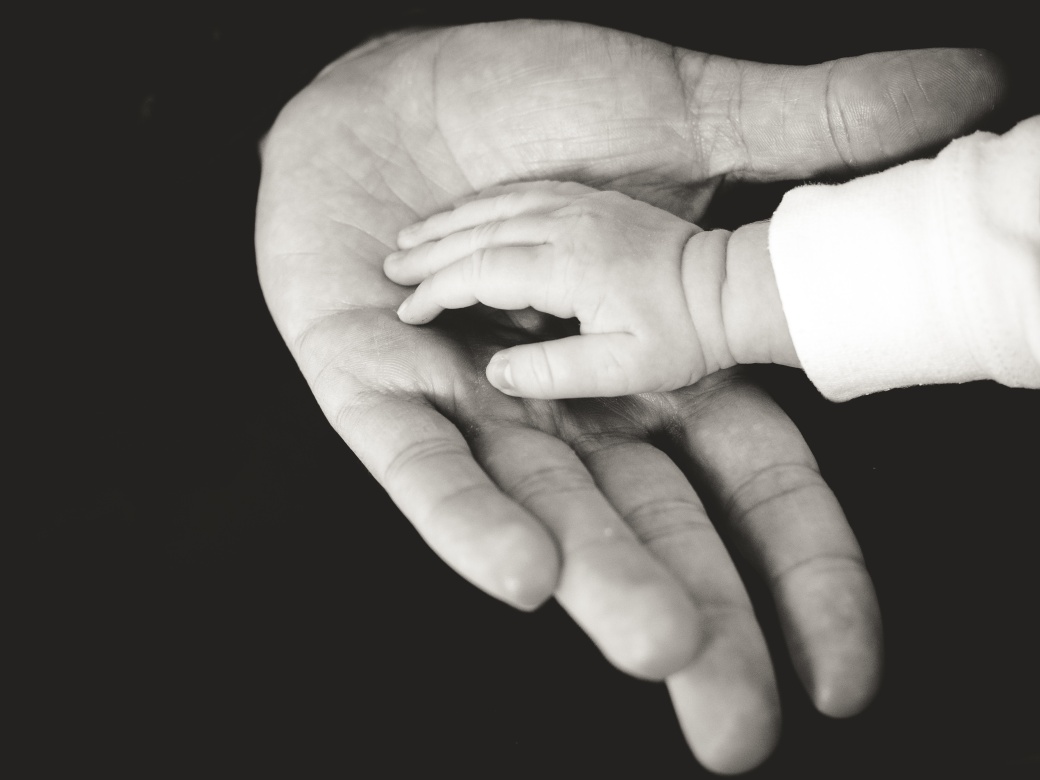
I loved this post, because I could talk about Myers Briggs results all day long. I’m INTJ, and the descriptions fit me to a tee. I’m not sure what my father is, though, and this has me wanting to find out immediately.
LikeLike
Wooo high five to my fellow INTJ-er! 🙂 Myers Briggs is literally my new favourite thing right now. Do let me know what your dad’s personality type is once you find out! Thanks so much for reading xxx
LikeLiked by 1 person
Very interesting post. It suits the upcoming Father’s day very well. It have me a deep thought about my father, like the times I spend with him. As a psych student, it is such a shame that I’ve never gotten my family to do the MBTI test. Haha. This will be the first item on my to-do list when I am back home. Thank you
LikeLiked by 1 person